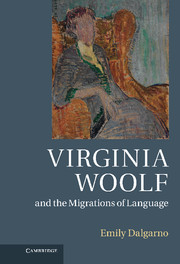Book contents
- Frontmatter
- Contents
- Preface
- Abbreviations
- The migrations of language: introduction
- Chapter 1 Translation and ethnography in “On Not Knowing Greek”
- Chapter 2 Antigone and the public language
- Chapter 3 Tolstoy, Dostoyevsky, and the Russian soul
- Chapter 4 Proust and the fictions of the unconscious
- Chapter 5 Translation and iterability
- Chapter 6 Assia Djebar and the poetics of lamentation
- Conclusion
- Bibliography of works cited
- Index
- References
Chapter 1 - Translation and ethnography in “On Not Knowing Greek”
Published online by Cambridge University Press: 07 October 2011
- Frontmatter
- Contents
- Preface
- Abbreviations
- The migrations of language: introduction
- Chapter 1 Translation and ethnography in “On Not Knowing Greek”
- Chapter 2 Antigone and the public language
- Chapter 3 Tolstoy, Dostoyevsky, and the Russian soul
- Chapter 4 Proust and the fictions of the unconscious
- Chapter 5 Translation and iterability
- Chapter 6 Assia Djebar and the poetics of lamentation
- Conclusion
- Bibliography of works cited
- Index
- References
Summary
The translator is the secret master of the difference of languages, not in order to abolish the difference but in order to use it to awaken in his own language, through the violent or subtle changes he brings to it, a presence of what is different, originally, in the original.
Maurice Blanchot, “Translating,” Friendship (Stanford: Stanford University Press, 1997)Woolf’s essay “On Not Knowing Greek” in The Common Reader (1925) captures the historical moment when Victorian debates about the proper way to translate Greek were giving way to a broader interpretation of classical culture that linked it to events in the twentieth century. Together with “The Russian Point of View” and “Montaigne” it suggests the need to modify the perception of this volume of her essays as “meditations on English writers for English audiences.” Rather translation creates a reader whose position in the world is contingent on history and ethnology. Woolf prepared to write the essay by immersing herself for several months in rereading Greek tragedy and Plato, with the aim of drawing the common reader into an area that was governed by the university dons, in particular Matthew Arnold and Francis Newman, whom she does not name, and a poet, Shelley, whom she does. Moving back and forth between her citations in Greek and from R. C. Jebb’s translations, Woolf blends Greek tragedy with an ethnographic sketch of Greek culture to create the sense that English is as foreign as Greek.
The title of the essay refers to the decades-long controversy about the teaching of Greek in British schools and universities that went on roughly from the 1870 debate on the Tripos at Cambridge until 1920, and deeply affected her understanding of the social significance of translation. Suzanne L. Marchand’s densely factual study, Down from Olympus: Archeology and Philhellenism in Germany 1750–1970, studies the German precursors of the debate in England. She details the background of “rapturous Graecophilia” that she dates from the time of Schiller to the cultural revolutions of the 1960s and 1970s. Her study of Altertumswissenschaft begins with the shift in classical study in the eighteenth century from individual passion to institutional ideal. By the nineteenth century, study of the ancient world “was dominated by scholars trained in philology, the art of textual emendation and interpretation.” Tracing the career of F. A. Wolf (1759–1824), she demonstrates that by the end of the eighteenth century Prussian classicism was dedicated to “the production of ‘disinterested,’ nonpopular, historical scholarship and contempt for comparative, ethnographic, and broadly philosophical questions.” The excavation of Olympia (1875–1881) began a series of grand-scale excavations that changed the history of Greek art to include pottery and the minor arts which in effect challenged the dominance of philology.
- Type
- Chapter
- Information
- Virginia Woolf and the Migrations of Language , pp. 18 - 37Publisher: Cambridge University PressPrint publication year: 2011

